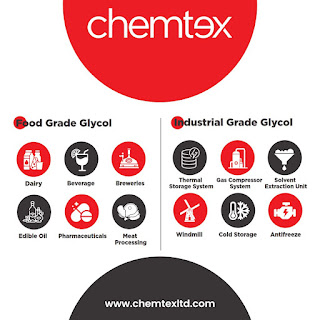Propylene glycol is used in a variety of products, including cosmetics, food additives, and pharmaceuticals. It also serves as a solvent for other chemicals.
What is Propylene Glycol?
Propylene Glycol is a synthetic
liquid used in a wide range of applications such as pharmaceuticals, cosmetics,
food, and manufacturing industries. It is an alcohol that absorbs water and
mixes with many solvents, made primarily made by treating propylene oxide from
refining petroleum with water.
It is used to absorb
extra water and retain moisture in medicines, cosmetics, or foods.
As a solvent, it is used in the food,
paint, and plastic industries. Also, propylene glycol is used in theatrical productions and
firefighting training to simulate smoke or fog.
Major Application Areas
Pharmaceutical
Pharmaceutical-grade
propylene glycol USP/EP is used as a non-active enabling agent, also known as
an excipient. As an agent, it carries flavors in food and beverages, helps
retain taste and moisture in pet and livestock feed, and acts as a carrier of
active ingredients found in cough syrup and gel capsules.
Industrial
Industrial-grade
propylene glycol is used as a heat-transfer medium that protects against
pressure bursts and corrosion, controls viscosity, and dissolves active agents.
Industrial propylene
glycol is also used in paints and coatings for wear and weather protection, as
an aircraft in liquid detergents, and antifreeze, and as a solvent in printing
ink.
As a basic building
block, it is used in its raw form to make formable plastics like unsaturated
polyester resins. The resins are used in windmill blades, furniture, marine
construction, gel coats, synthetic marble coatings, and sheet molding compound
and for heavy-impact surfaces such as floors.
In Cosmetics.
As a Deodorant Alternative: Propylene glycol can serve as a
deodorant alternative because it works by absorbing moisture. This means that
it will not leave any residue behind after use.
It can also be used as a solvent in nail polish removers.
Propylene glycol keeps
personal care products consistent, soft, and moist. This includes deodorant
sticks, sunscreen, shampoos, body lotions, face creams, and lipstick.
Additionally, it works as an excipient to stabilize foam in personal care and
health care products.
As a Food Additive.
Propylene glycol is commonly used as a food additive because it
helps keep foods fresh longer. It is also used as a solvent in cleaning
products.
In Medicine.
Propylene glycol can be found in medicine as a solvent. It is
often used to dissolve medications such as insulin and antibiotics.
As a Fuel Additive.
Propylene glycol is also commonly used as a fuel additive. This
means that propylene glycol is added to gasoline to make it burn more
efficiently.
Chemtex Propylene
Glycol Antifreeze
Chemtex manufactures Corrosion
Inhibited Propylene Glycol-based Antifreeze with its unique combination of
properties supporting many end-use applications.
Primary functions as
drawing away heat, and allowing the engine to operate efficiently, with lesser
malfunctions and damages to its parts. The inhibitor package inhibits glycol degradation,
not allowing sludge deposition, while increasing the glycol operational life
and metallurgy, whilst not affecting freeze protection properties. Also
designed to protect brass, copper, steel, cast iron, aluminum alloys, and other
components such as rubber hoses, rubber seals, plastic components, etc.
Chemtex Propylene Glycol based HTF
is NSF Certified for use as a Heat Transfer Fluid with Incidental Food Contact.
It is also listed with FSSAI under Food Product Category 99 for Substances
added to Food.
Check out our range of propylene and ethylene glycol antifreezes at https://www.chemtexltd.com/products-and-solutions/heat-transfer-fluid/glycol-antifreeze/
